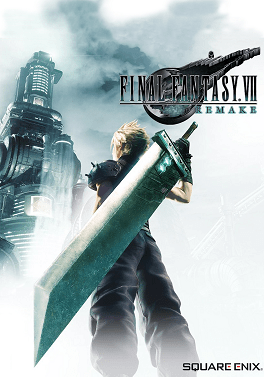Media Reviews
Fifteen years after first being announced at the Electronic Entertainment Expo (E3) and twenty-three years after the original game’s debut, the long awaited Final Fantasy VII Remake was released. The classic FFVII is considered groundbreaking as it paved the way for other JRPGs outside of Japan, and it was responsible, along with anime, for making local pop culture take off in the global market. According to Matt Alt, FFVII injected “a megadose of Japanese sensibilities” into the American mainstream, including the characters with big eyes and spiky hair, the manga-style melodrama, the androgynous heroes, and the very idea that games could be profound in so many ways.
FFVII was remarkably innovative in the late 1990s, as Pablo González Taboada’s book on the franchise and the Vol. 2 of Dark Horse’s Final Fantasy Ultimania Archive both recall. The game’s basic concept, drawn from the cyberpunk subgenre, presents an industrial world of highly advanced technology in contrast to deep inequality and humanity in decline. With high-tech vehicles, garments, locales and other cyberpunk motifs, the city of Midgar lays its roots in Fritz Lang’s Metropolis (1927) and later futuristic urban landscapes as depicted in Blade Runner (1982) and Akira (1988). An exponent of cyberpunk storytelling, FFVII addresses late capitalism, existential dilemmas, psychological disorders, identity crisis, climate change, and class struggle. There are also nods to steampunk retrofuturism from previous games in the franchise, all reshaped for a more dieselpunk version. Biopunk themes are also relevant, such as the plot of the genetic modification that Shinra’s soldiers undergo.
Since its debut, FFVII has inspired countless other games, spin-offs, animated shorts, and a CGI film. What fans wanted most, however, was a remake, which was finally released in 2020. Far beyond introducing FFVII to new generations, the main goal of the project was to create a “new and nostalgic” experience for longtime fans. Thus, the Remake captures a broader sense of nostalgia in a context where a range of disparate cultural texts return to be explored for their intrinsic nostalgic value; at the same time, it rebuilds game systems to fit contemporary tastes.
Being the first installment in a series focused on recreating the classic game, the Remake only covers FFVII’s first act. The premise is the same: a group of heroes tries to save the world from capitalist exploitation. Players control the mercenary Cloud Strife, who joins the eco-terrorist group AVALANCHE in its resistance against Shinra, a megacorporation that is harvesting the planet’s energy to feed an industrial society and generate cutting-edge technology. However, the Remake deepens characters’ development, recreating them with updated visuals. The new model for Cloud has more nuance, with the handsome, androgynous, sensitive hero reframing and deconstructing the heteronormative masculinity archetype. Cloud’s effeminate features echo the archetypal images of androgynous male beauty, which Yumiko Iida relates to the visually attractive male idols of contemporary Japanese youth culture. This topic invites scholarly discussion on the “feminization of masculinity” and the androgynous male ideal of JRPG (and anime) heroes, especially in the Final Fantasy franchise.
Social criticism converges with climate justice in both FFVII and the Remake. According to Stephen K. Hirst, the classic game has inspired an entire generation of climate activists, including members of Greenpeace. It harshly denounces the savage jaw of capitalism, the power and monopoly of megacorporations, environmental degradation, and social inequality. More than two decades after FFVII’s debut, the criticism has not lost its relevance and is gaining momentum as a driving force in the environmentalism agenda in times of global warming. The Comic Book Resources noted how the social issues raised by the game are even more relevant today than they were in 1997. Following this argument, Dani Di Placido has drawn parallels between the game’s events – Shinra as a predatory force and the meteor’s approaching – and contemporary issues such as climate change, environmental catastrophes, economic collapse, and the COVID-19 pandemic. As a critique of the Anthropocene, Final Fantasy VII Remake could be of scholarly interest to environmental fiction and climate fiction scholars, since they often intersect in speculative fiction studies.
WORKS CITED
Alt, Matt. Pure Invention: How Japan Made the Modern World. New York: Crown Publishing Group, 2020.
Final Fantasy Ultimania Archive. Vol. 2. Milwaukie: Dark Horse Comics, 2018.
Gramuglia, Anthony. “Final Fantasy VII’s Story Is More Meaningful Today Than in 1997”. Comic Book Resources, June 22, 2019. Accessed 6 July 2022. https://www.cbr.com/final-fantasy-viis-story-relevant-today/
Iida, Yumiko. “Beyond the ‘feminization of masculinity’: transforming patriarchy with the ‘feminine’ in contemporary Japanese youth culture”. Inter-Asia Cultural Studies, v. 6, 2005, pp. 56-74. Accessed 10 July 2022. https://www.tandfonline.com/doi/abs/10.1080/1462394042000326905
Hirst, Stephen K. “How Final Fantasy VII radicalized a generation of climate warriors”. Ars Technica, 29 July 2021. Accessed 6 July 2022. https://arstechnica.com/gaming/2021/07/how-final-fantasy-vii-radicalized-a-generation-of-climate-warriors/
Placido, Dani Di. “In Our Sci-Fi Dystopia Of 2020, ‘Final Fantasy VII’ Feels More Timely Than Ever”. Forbes, April 5, 2020. Accessed 6 Jul. 2022. https://www.forbes.com/sites/danidiplacido/2020/04/05/in-our-sci-fi-dystopia-of-2020-final-fantasy-vii-feels-more-timely-than-ever/
Taboada, Pablo González. Final Fantasy: la leyenda de los cristales. Palma de Mallorca: Dolmen, 2013.
Lúcio Reis-Filho is a Ph.D. in Media Studies, film critic, filmmaker and historian specializing in the intersections between cinema, history and literature, with focus on the horror and science fiction genres. He writes book, film and game reviews, and is coordinator of Projeto Ítaca (https://projetoitaca.com.br/), a Brazilian educational website devoted to the tropes and representations of mythology in the media. His research and academic interests are essentially interdisciplinary, as they cover Cinema, Visual Arts, History, Comparative Literature and Game Studies.

